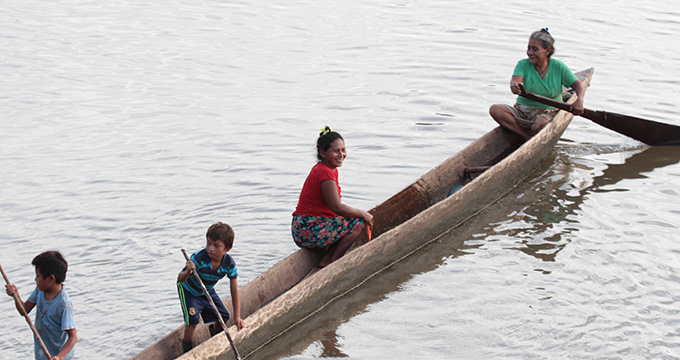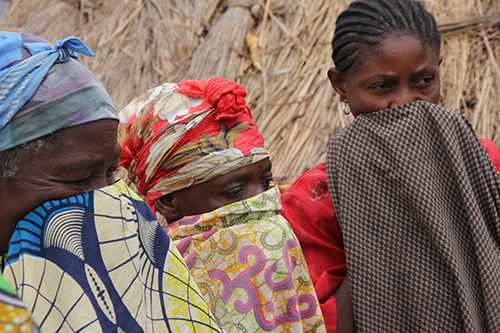| Online: | |
| Visits: | |
| Stories: |

| Story Views | |
| Now: | |
| Last Hour: | |
| Last 24 Hours: | |
| Total: | |
Twenty Years of Progress, Yet Gender Equality Remains Elusive
United Nations*, New York, 6 March 2015 – “I already heard in the past that women and men are equal,” said Firuza Sirojeva, a schoolgirl in Tajikistan, after attending a workshop on women’s rights. “But here, at the training, I learned that it might be real.”

Women guides venture into a remote village in Savannakhet Province of the People’s Democratic Republic of Lao. © UNFPA/Micka Perier
This year, International Women’s Day, on 8 March, marks 20 years since the historic World Conference on Women in Beijing underlined gender equality as a global priority.
Solid evidence links the advancement of women’s and girls’ empowerment to the health, education, productivity and welfare of future generations. Yet, around the world, gender equality remains elusive.
“No country in the world has achieved gender equality, and discrimination in the law persists in many countries,” said UNFPA Executive Director Dr. Babatunde Osotimehin, in his statement marking International Women’s Day.

Gender-based violence in the remote Amak Community in Nicaragua led UNFPA, UN Women and other partners to introduce a community judge system to protect women’s rights. © UNFPA/Oscar Duarte
Still held back
“Women’s rising education attainment and workforce participation have not been matched with equal prospects for advancement and equal pay,” he said.
Although women comprise roughly half the population, they own only one per cent of the world’s wealth, according to the United Nations Development Programme.
Poverty exacerbates the suffering of women and girls. One in three girls in developing countries are married before reaching age 18, and one in nine are married before age 15.
“And everywhere, violence against women and girls continues to take a devastating toll,” said Dr. Osotimehin.
An estimated one in three women will experience physical or sexual abuse in her lifetime. An estimated 100-140 million women and girls alive have undergone some form of female genital mutilation (FGM).

Women in crisis situations are especially vulnerable. These survivors of gender-based violence are receiving psychosocial support and skills training from a humanitarian programme in Katanga Province, Democratic Republic of the Congo. © OCHA Gemma Cortes
The path forward
In 1995, the Beijing Declaration and Platform for Action offered a global blueprint for advancing women’s rights.
Since then, governments and activists have made enormous strides. “Today, more girls are going to school, more women have joined the labour force, and more women have access to sexual and reproductive health services, including family planning,” said Dr. Osotimehin.
Renowned Jordanian midwife Munira Sha’bana has witnessed this progress first-hand.
“Twenty years ago, women used to receive orders from male family members and elderly women on reproductive health in general, on the number of children they should have, and on all the other personal reproductive decisions to be taken,” she said.
Today, she added, Jordanian women “know their rights, and they decide for themselves the number of children they want and how to manage their health.”

Maternal mortality has dropped by nearly half in the last 20 years, one of the many signs of progress in women’s rights and equality. A new mother with her infant in Ashgabat, Turkmenistan. © UNFPA Turkmenistan
Inspiring further change
These successes often have a cascade effect: When a woman or girl is empowered, sets an example for the whole community, helping to promote the rights and opportunities of those around her.
When Haja Aicha in Sudan learned about the harms caused by FGM, she mobilized the women in her community against it – not only helping to spare the girls in her village from this harmful practice but also showing the community the value of women’s leadership.
“I always felt I had a role to play,” she told UNFPA.
When Zeinabou, a 15-year-old girl in Niger, escaped her abusive husband, she sought not only freedom from violence but also the knowledge to protect herself from further harm.
She enrolled in the UNFPA-supported Action for Adolescent Girls workshop, where she learned about the harms caused by child marriage and adolescent pregnancy. She was also trained in human rights, literacy and basic financial skills.

Adama Hamadou Alzouma was forced to leave school after becoming pregnant at age 14. The father of the baby abandoned them soon after. She is enrolled in UNFPA’s Action for Adolescent Girls programme in Niger. © UNFPA/Tagaza Djibo
Zeinabou was inspired to reach out to other girls, urging them to become educated and learn about their rights.
“As soon as I can, I tell my friends everything I know,” she said.
Girls in Ethiopia, Guatemala, Zimbabwe and many other countries taking these lessons to heart, becoming agents of change on behalf of the women and girls in their communities.
And these achievements must continue to grow. “We should encourage women to reach the high ranks of decision-makers,” said Ms. Sha’ban. “We should encourage women to seek continuous training, and to seek education, and to be empowered in all stages of their lives.”
*Source: United Nations Population Fund (UNFPA). Go to Original.
Read also:
‘Ma petite’: 80% of French Women Face Sexism in Workplace
International Women’s Day 2015 – MAKE IT HAPPEN
Women’s Rights: Personal Testimonies from South Sudan
Hakim Mai, an Inspiring Climate Change Fighter
‘Uniting with Women to Fight Corruption’
Women Earn on Average 77 % Less Than Men
At Current Rate, It will Take Over 80 Years for Women to Achieve Parity in Employment
Int’l Women’s Day 2015: Women Farmers Key to Fighting Hunger
In Africa, 70% of Crop Production Depends on Women Yet They Still Own Only 2% of the Land
One in Three Women Worldwide Is a Victim of Violence — Refuse Abuse
Over 140 Million Girls and Women Have Undergone Some Form of Genital Mutilation — Key Facts
Violence against Women, Girls Is a ‘Global Pandemic’ that Destroys Lives, Fractures Communities – UN
1 in 3 Victims of Human Trafficking Is a Child — Girls, Women Account for 70% of the Total
#OrangeUrHood Campaign Kicks Off UN-led Effort to End Violence against Women
Ending Violence Against Women “A Matter of Life and Death”
UN Special Rapporteur on Violence against Women Heads to UK to Investigate Abuse
One Million Sign to End Violence Against Women in Pakistan
Pakistan: Girls Tormented by Stigma After Rape
The Terror of Unarmed Women Facing Armed Men
Six in 10 Women Suffer Physical and/or Sexual Violence
Women at ‘Extreme Risk’ in 80 Countries
Violence And Death For Millions Of Life-Givers
Who Dares to Challenge a 32 Billion Dollars Business – Human Trafficking?
Say ‘NO’ – UNiTE to End Violence against Women
Amazing UN: Horrific Massive Rapes “Could Be” Crimes Against Humanity!
UN to Jordan: ‘End Violence against Women!’
Afghanistan, The Worst Place To Be A Mother Or A Child
Africa’s Boat People, Victims of Abduction, Extortion, Sexual Assault and Kidnapping
‘Because I Am Girl – So, What about Boys’?
European Union: 880,000 Victims of Forced Labour, Sexual Exploitation
Alarming Reports of Extreme Sexual Violence against Malian Women, Girls
Is Rwanda The Land of Gender Equality?
2015 Human Wrongs Watch
Filed under: Africa, Asia, Latin America & Caribbean, Market Lords, Middle East, Others-USA-Europe-etc., The Peoples
![]()
Source: http://human-wrongs-watch.net/2015/03/07/twenty-years-of-progress-yet-gender-equality-remains-elusive/



